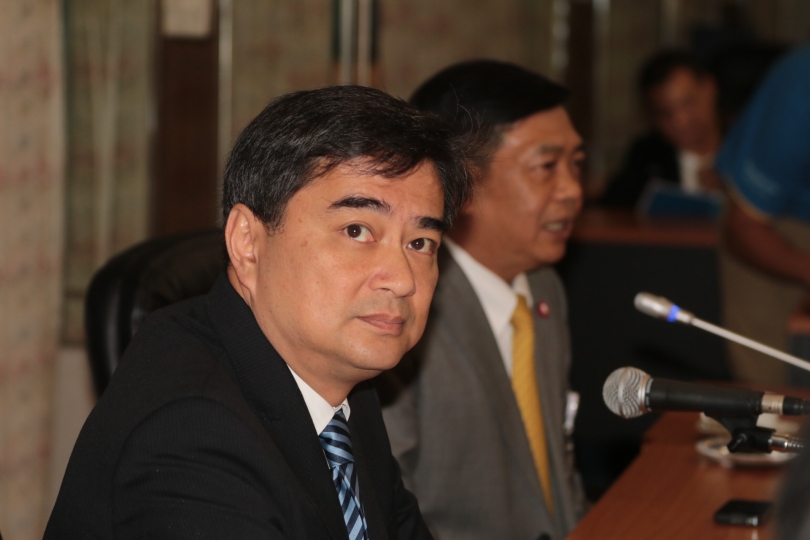We need trust, not every politician is evil, Abhisit tells ‘suspicious’ Prayut

DEMOCRAT PARTY leader Abhisit Vejjajiva yesterday urged Prime Minister Prayut Chan-o-cha not to be too sceptical about politicians after what he called the PM’s “suspicious” reaction to a politician who offered political solutions for the country.
DEMOCRAT PARTY leader Abhisit Vejjajiva yesterday urged Prime Minister Prayut Chan-o-cha not to be too sceptical about politicians after what he called the PM’s “suspicious” reaction to a politician who offered political solutions for the country.
“You can see Prime Minister Prayut Chan-o-cha reacted with suspicion as he felt there could be hidden motives [behind such proposals]. We want to create trust in society. Even though politicians were part of the problems in the past, not every politician is evil. After all, our country cannot avoid having representation as a ruling system,” Abhisit said.
He was referring to Prayut’s reaction to Pheu Thai Party politician Sudarat Keyuraphan’s proposal on Monday that she would discuss solutions for the country with veteran politicians and present their conclusions to the government.
Asked if he supported Sudarat’s proposal, Abhisit said that since the matter had been politicised, talks between politicians and Prayut would be useless. “It is of no use to create tension, if politicians are perceived as creating political issues or causing scepticism and widening gaps. Talk would be useful if it benefited society and reduced gaps between the political and other sectors.”
The PM on Tuesday responded to Sudarat’s proposal that politicians who wanted to stage any political movements should undergo judicial procedures before planning discussions with the government.
Abhisit was speaking while a team from the National Reform Steering Assembly, led by NRSA vice president Alongkorn Ponlaboot, met with him to report the assembly’s reform progress and seek the Democrats’ opinion on reforms.
Abhisit questioned the NRSA members on how the country was going to be reformed. “We have never heard what the principles of reform are. The words ‘stability’, ‘prosperity’ and ‘sustainability’ are goals but not principles. Reform will not be accomplished without public participation and support from political parties. Political parties must truly represent the people,” Abhisit said.
Over the past two years, the Cabinet and the National Legislative Assembly passed 170 bills, Abhisit said. “Most laws that are passed stress giving more power to permanent state officials and setting up new state agencies. This goes against reform principles,” he said.
He said he felt the NRSA was not totally in charge of the reform direction. “Though the NRSA’s responsibility is to implement reform, it is only a person who is not behind the wheel but next to the driver who can guide the driver who may or may not believe the NRSA,” he said. He said the most important thing was the country’s top law, and he preferred the charter draft written by the former Constitution Drafting Committee led by Borwornsak Uwanno.
“I support especially police reform that separates investigation from the Police Department. It is much clearer than the present charter [draft], which, compared with the 1997 and 2007 charters, is a step back in terms of people’s rights and liberties,” he said.
“A former National Reform Council member told me that the council could only present reform plans and it is up to the people in power to pick what plans they want and call it reform,” he said.
Abhisit called on the government to allow political parties to hold meetings in order to reform themselves.
The NRSA team also had talks with key figures of the Pheu Thai Party including Somchai Wongsawat, Chaturon Chaisang and others to report the assembly’s reform progress and seek the party's opinion on reforms.
RELATED
